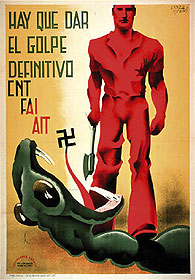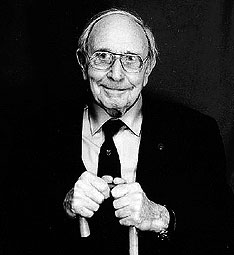
| HOME |
| NERVE |
| REVIEWS |
| ARCHIVE |
| EVENTS |
| LINKS |
| ABOUT US |
| CONTRIBUTORS |
| BACK ISSUES |
| CONTACT US |
Back to index of Nerve 9 - Autumn 2006
 'Madrid
Today - Merseyside Tomorrow'
'Madrid
Today - Merseyside Tomorrow'
Liverpool & the Spanish Civil War, 1936 - 1939
This year sees the 70th anniversary of the outbreak of the Spanish Civil War. In July 1936 the traditional ruling class of Spain - backed by most of the army under General Francisco Franco - tried to overthrow a democratically elected centre-left government that had taken office only five months earlier. However, the initial attempt to seize power failed, due in most part to the resistance of the Spanish working class, which defeated the rebellious troops in many of the large cities. What had begun as a coup attempt turned into a civil war.
While the Spanish war had its own complex causes, and though resistance to Franco took on a revolutionary character in large parts of the country, it was seen by many people outside Spain as a straight fight between democracy and fascism. But the British government refused to act, supporting a bogus 'non-intervention' agreement signed by the major European powers that saw the Madrid government prevented from buying arms for its defence, while Hitler and Mussolini sent troops and equipment to aid Franco's forces.
Anti-fascists around the world were horrified - though not surprised - by the passivity of the democratic governments. By 1936 appeasement was the preferred policy of Britain and France. But for many ordinary people, the prospect of fascism taking power in yet another European country was too much to bear. Huge solidarity movements sprang up in many countries, raising money and sending food and supplies to help the people of Spain. In addition, around 40,000 foreigners went to fight fascism in Spain in defiance of their own governments. Over two and a half thousand Britons fought there, with over five hundred killed. £50,000 was raised by public subscription to help the families of these fallen volunteers.
In Britain, organisations like the Aid Spain movement and the Spanish Medical Aid Committee reflected widespread popular support for the anti-fascist cause. Around £2 million was donated in Britain during the civil war, with the Medical Aid Committee alone raising £60,000 to send ambulances and crews to Spain. Thirty ships were chartered by British campaigners between 1936 and 1939, which were then loaded with food and sailed through the naval blockade to Spain. Almost four thousand Spanish and Basque children - many of them orphans - were evacuated to Britain, where political parties, trade unions and church groups combined to provide accommodation and education.
On Merseyside there was widespread sympathy for those resisting Franco. The Merseyside Spanish Aid Committee took collections in factories and on the docks, and in many workplaces people put in extra shifts and donated the pay. Opposition to fascism had a cultural aspect in Liverpool too. Merseyside Left Theatre (forerunner of today's Unity Theatre) performed plays about Spain to packed houses. The Left Theatre cast - together with other local activists - clearly linked the war in Spain with the struggle against fascism in Britain. Liverpool was the scene of several large and successful demonstrations against Oswald Mosley's British Union of Fascists. Adverts for Left Theatre productions opened with the words 'Madrid Today - Merseyside Tomorrow'.
In 1938, local activists chartered a ship, loaded it with food and sent it to Spain. Campaigners even persuaded large firms to become involved. Local companies such as Lever Brothers, Crawford's and Bibby's donated money and food, and Harold Bibby chaired the local Spanish Aid Committee. Bibby's two sons fought in Spain in the International Brigades, and one was killed at the battle of Jarama in February 1937. Merseysiders were also part of the network that helped look after Spanish and Basque children, with many being cared for at the Nazareth House and Roman Catholic Girls' orphanages in Liverpool, as well as at sites on the Wirral.
 Another
means of helping the Republican cause appeared when the crew of a Spanish
ship - the SS Linaria - refused to set sail from Liverpool for Spain.
The Linaria was carrying nitrate, which the crew believed was bound for
Franco's forces and would be used to make explosives. When the ship's
owners charged the crew with mutiny, they sought the help of a local lawyer,
Sydney Silverman. In court, Silverman argued that to deliver the cargo
would breach the government's commitment to the Non-Intervention Pact.
The judge agreed, and the Linaria didn't sail.
Another
means of helping the Republican cause appeared when the crew of a Spanish
ship - the SS Linaria - refused to set sail from Liverpool for Spain.
The Linaria was carrying nitrate, which the crew believed was bound for
Franco's forces and would be used to make explosives. When the ship's
owners charged the crew with mutiny, they sought the help of a local lawyer,
Sydney Silverman. In court, Silverman argued that to deliver the cargo
would breach the government's commitment to the Non-Intervention Pact.
The judge agreed, and the Linaria didn't sail.
But the most dramatic contribution was that of the local volunteers who travelled to Spain to fight against Franco. Around 130 Merseysiders - including two Liverpool City Councillors - fought in the International Brigades and other anti-fascist militias. Twenty eight local men were killed during the desperate and ultimately unsuccessful war against Franco. Many of those who returned home not only fought fascism again during the Second World War, but made major contributions to the labour movement at local and national level. One of them - Jack Jones (see photo on the right) - went on to lead the Transport & General Workers' Union.
Jones summed up the feelings of all the Merseyside volunteers in a letter, written from Barcelona in July 1938. Attacking the appeasement policy of the British government, he wrote: “We believe that there can be no compromise between fascism and the democratic ideas for which we ourselves have come here to fight”. History proved them right, and the government wrong.
Further Reading:
The Trophy is Democracy: Merseyside, Anti-Fascism & the Spanish Civil
War, by Dave Auty.
No Boots to My Feet: Experiences of a Britisher in Spain, 1937-1938, by
Bob Clark (a Liverpool volunteer in the International Brigades).
The Spanish Labyrinth, by Gerald Brenan.
Homage to Catalonia, by George Orwell.
The Spanish Cockpit, by Franz Borkenau.
Merseyside International Brigades Network:
25/9/08 - A group of Merseysiders and ex-Merseysiders are in the process of setting up an organisation, Merseyside International Brigades Network, with the aim of researching and commemorating the role of Merseyside in the Spanish Civil War and the International Brigades. To find out more visit www.mibnet.org.uk
Sorry Comments Closed
Comment left by LEE WIGNALL on 26th February, 2007 at 10:23
Dear Sir,
I am doing an thesis on the Brits who fought in the Spanish Civil war, have you any books I could buy, or could you advise me in any way or put me un the right direction please, as I want the world to know what these brave men had to contend with.
Comment left by LEE WIGNALL on 26th February, 2007 at 10:28
Could you put me in contact with Mr Jones as I am doing a theses on the the Brits who fought in The Spanish Civil War.
Lee Wignall.
Comment left by bill hargreaves on 20th November, 2007 at 22:20
sir apologies for the approach, but i am trying to get in touch with lee wignall, please could you forward him my e-mail address. thank you
Comment left by ben houlton on 3rd September, 2008 at 20:00
I saw the exhibition on the bbc but i am in spain.When does it end ? I would like to visit.Also any info on the International Brigade Assoc would be helpful.Thanks.
Comment left by ben houlton on 3rd September, 2008 at 20:04
For a opposite view contact the Catholic Truth Society in London.They have some pamphlets 1936-1939 for sale.
Comment left by Mike on 23rd September, 2008 at 22:52
Dont forget the role of Frank Bright (ex Bideford) later Rhondda and Liverpool
Comment left by Jeremy Hawthorn on 20th November, 2008 at 0:36
An excellent article but one correcction on the Linaria. This was a ship from North-East England that was in Boston USA when its crew refused to load a cargo of nitrate destined for Seville. They were discharged over there. When they returned to England they landed in Liverpool where they were hit with prosecution for impeding the passage of a ship. They defended their case in the Liverpool courts and were eventually acquitted. So unless we find evidence of local solidarity action, I'm afraid the only Liverpool connection with this uplifting tale is through the lawyers (groan),
Comment left by Mr Karl Ambler on 27th August, 2010 at 11:34
I would like too share this information with you all.A few weeks ago I ran my address though a serch engine on my pc.
I discovered that a man lived at my address at the time of the civil war in spain his name was Christopher May he was a ships plumber andfought in the spanish civil war he was pronounced M.I.A. on the 09/07/37 does anyone have more info on this man please
Comment left by Steve Jones on 4th October, 2010 at 10:14
My Wife's uncle Edward Francis Jackman from Liverpool died at Jarama Feb 1937.
He was a communist and catholic he could not understand what the catholic church were playing at!! if any one know's what happened to him at Jarama?
WE the family would be very grateful.
God Bless Steve
Comment left by Susan Worthington on 18th October, 2010 at 21:28
To Karl Ambler
Christopher May was my uncle. I am trying to find out about him and information is just coming to light about him. You can contact me on suevv123@aol.com. I have some information about him but woukd love to know more. He died in Aragon in August 1937. Is it Oakdale Avenue that you are talking about?
Thanks. Sue
Comment left by Richard Ryan on 28th June, 2011 at 22:17
I am currently completing a thesis on the impact of the war on Liverpool's Catholic Community. Anybody with any information or stories about relatives are welcome to get in touch.
Comment left by Tom McGrath on 30th September, 2012 at 19:51
Looking for information on Douglas J McGrath, can anybody help?